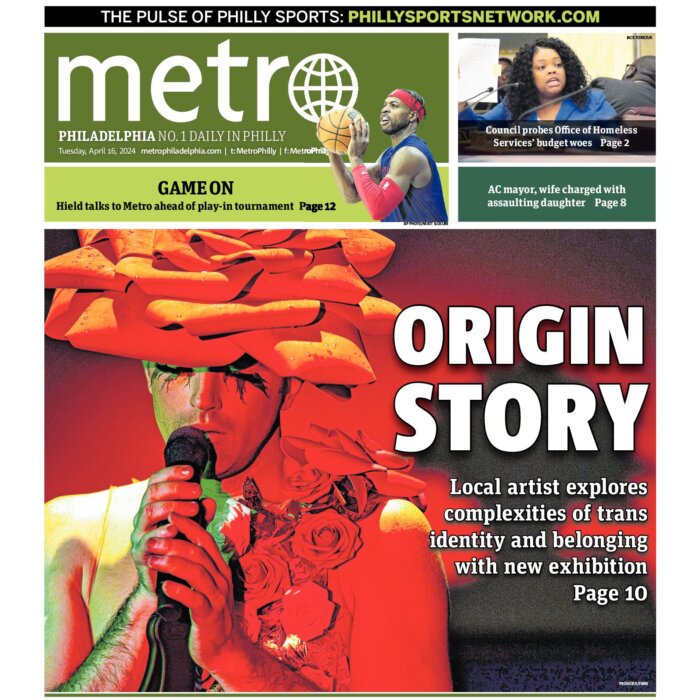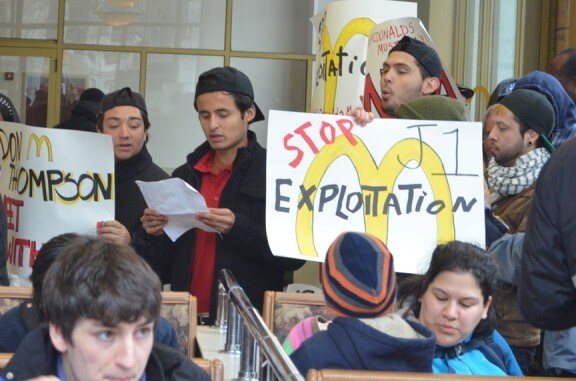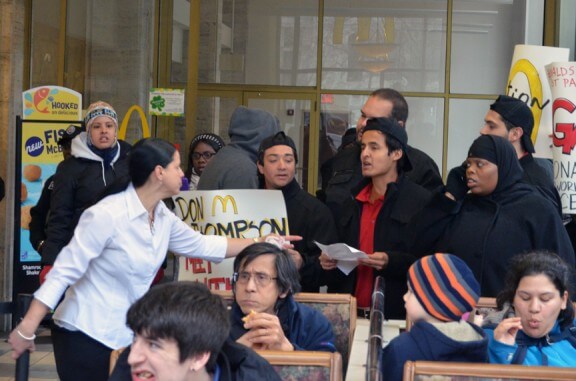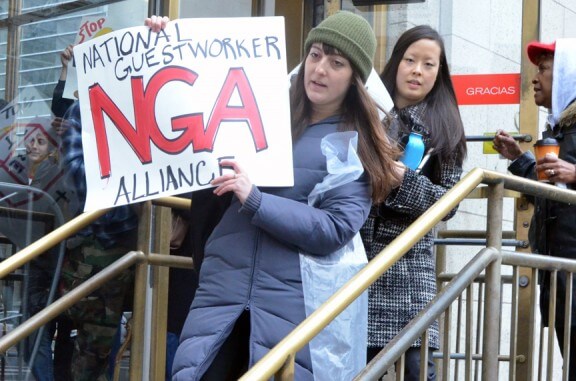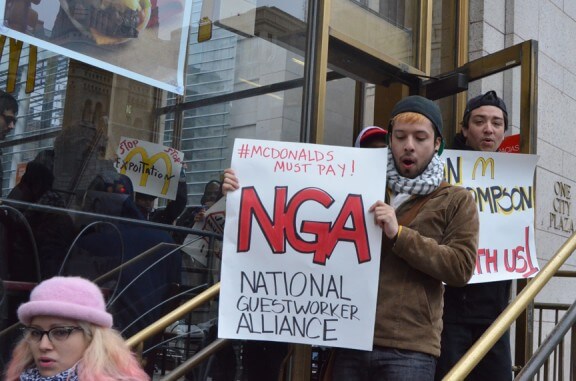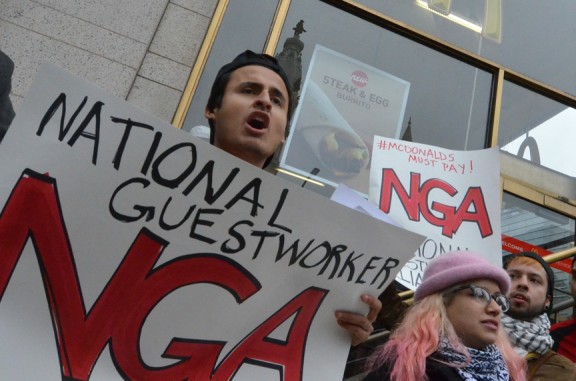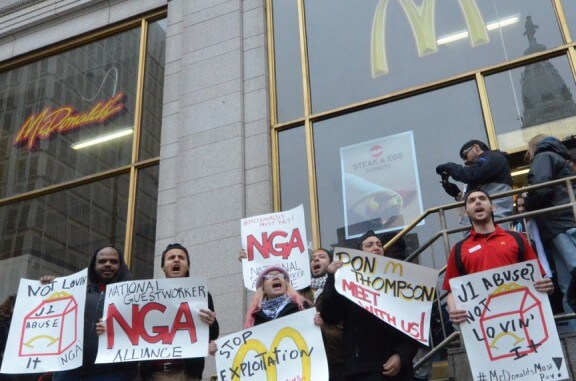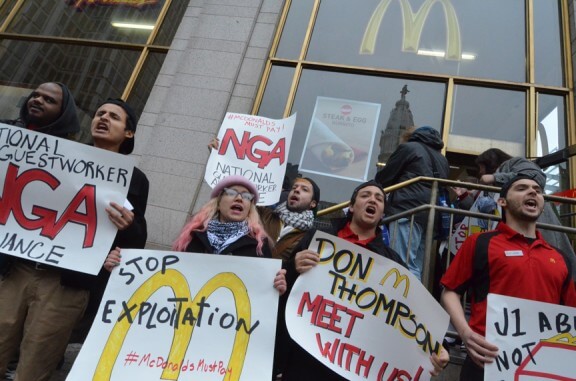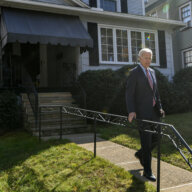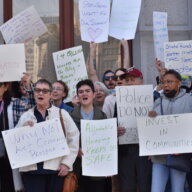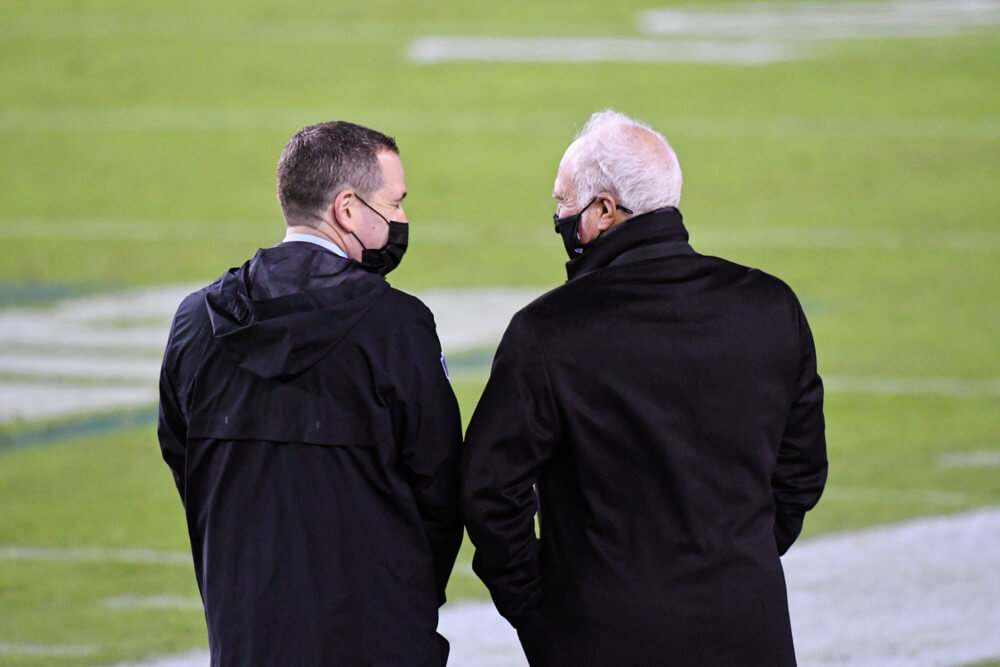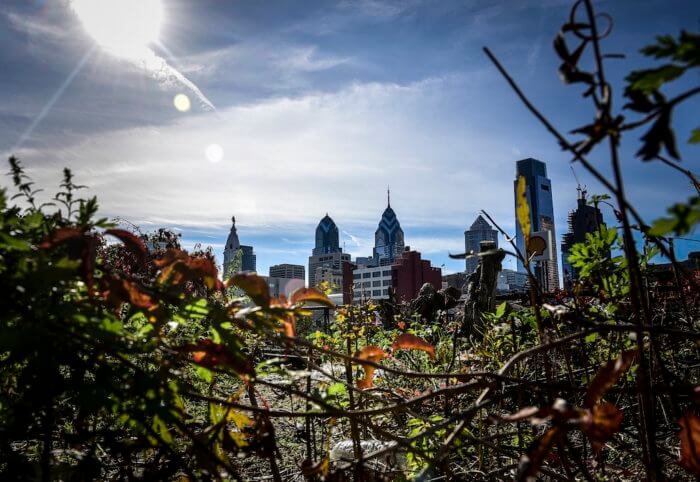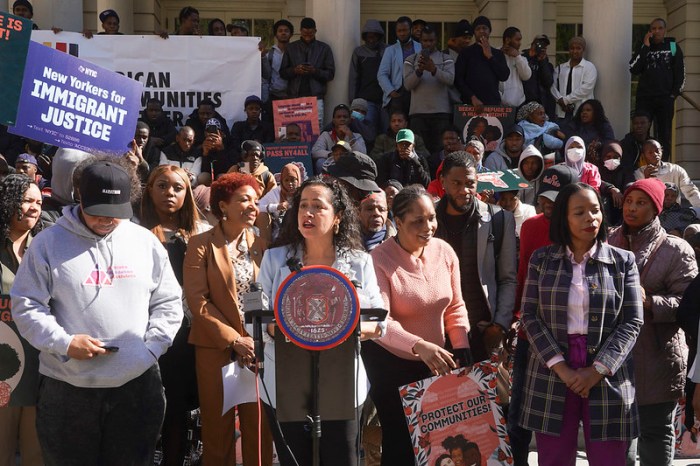A group of students who were allegedly lured to the U.S. under the guise of a cultural exchange program but instead forced to live in cramped basements and work under deplorable conditionsat a Camp Hill, Pa. McDonald’s brought their protest to Philadelphia Saturday.
About 20 student guest workers and advocates from the National Guestworker Alliance and Fight for Philly held an impromptu mic check inside the McDonald’s at Broad and Arch streets, chanting and holding signs detailing the chain’s so-called abuses of workers’ rights.
They were escorted from the building by several Philadelphia police officers McDonald’s had stationed inside, presumably in anticipation of the protesters’ arrival. Demonstrators poured onto the sidewalk outside and continued to rally under the watchful eye of Civic Affairs agents.
WATCH:
The students from Asia and Latin America say they paid $3,000 to $4,000 each to take part in cultural exchange programs through work-study abroad company GeoVisions, who helped them obtain documentation from the U.S Department of State’s J-1 visa program and hooked them up with what were supposed to be decent American jobs.
Instead, they said they were forced to toil under slavish conditions at one of three Central Pennsylvania McDonald’s franchises owned by Andy Cheung.
“The employer basically abused the program to force us to live and work like illegal immigrants,” student Jorge Rios said.
Cheung allegedly crammed the students into children’s bunk beds stacked in the basements of several buildings he owns and automatically deducted room and board from their already meager paychecks.
The students, with the backing of the Guestworkers Alliance, went on strike March 6 and have taken their fight nationwide, calling for reforms to the J-1 Visa program and demanding a face-to-face meeting with McDonald’s CEO Don Thompson to discuss how the chain treats its workers.
“We’re already seeing a better side of the U.S.,” Rios said Saturday, “which is standing together and sticking up for your values and beliefs.”
Unhappy meals
The students’ allegations include:
>> They were paid $7.25 an hour but given as little as four hours of work each week.
>> They were alternately made to work up to 25 hours at a time with no overtime pay and were called in to cover the shifts of absentee workers at their employer’s mercy.
>> Cheung forced student workers to live in the basements of his buildings, cramming up to eight students into each room.
>> Cheung automatically deducted $300 in monthly room and board from student workers’ pay, bringing their net salary far below minimum wage.
>> Cheung and franchise managers addressed complaints by punitively cutting students’ working hours and by threatening to conduct surprise home visits or to have the students deported.
One student’s story
Argentinian social communications major Jorge Rios, 27, said he saw posted in the hallway of the Universidad Nacional de Misiones GeoVisions advertisements billing a cultural exchange program.
“It advertised an experience living in America, working and traveling and meeting interesting people, going to interesting places – stuff like that,” he said.
Rios said he spent over $3,000 in payment to GeoVisions for help obtaining his visa, travel to fill out paperwork at the U.S. Embassy in Buenos Aires – 14 hours away from his hometown – and on airfaire to the U.S.
He arrived in Camp Hill in mid-December, where he said he was put to work as a fry cook at one of Cheung’s McDonald’s franchises and made to suffer dungeon-like conditions living in employer-owned housing.
“It was me and five other guys living in a basement,” he said. “There was no transportation, we were paid no overtime and the basement was unfinished – it wasn’t even conditioned to live in.”
Rios said his meager salary was further eroded by the mandatory purchase of equipment like special kitchen shoes and deductions for room and board.
“Our employer recycled money for rent,” he said. “We didn’t even get to see it. It was automatically deducted from our paychecks.”
Student workers spent months researching their rights on the Internet, where they read an article about student guest workers in Palmyra, Pa. who in 2011 partnered with the Guestworkers Alliance to mount a similar protest.
“We began having meetings and we became organized,” Rios said.
Rios and his fellow exchange workers walked off the job March 6 and have since protested in Pittsburgh and Manhattan. They received federal clearance to remain in America for roughly one more month and plan to keep pressing for change.
“If Don Thompson doesn’t listen to our request for a meeting by March 25, we will travel to Chicago and protest outside his home,” Rios said.
Burger chain backlash
McDonald’s announced on Thursday it severed ties with Cheung.
“We began investigating the situation in Pennsylvania immediately upon learning of the issues involved,” a spokeswoman said Friday in an emailed statement.
“The franchisee has agreed to leave the McDonald’s system. We are also working on connecting with the guest workers on an individual basis to most effectively address this situation.
“Finally, we are providing information to franchisees who may participate in the guest worker program to ensure they understand both the letter and spirit of all the requirements of the State Department’s J-1 Visa program, as well as the expectations for full compliance by McDonald’s.”
The students responded in a statement. “McDonald’s’ action is an important admission of labor abuse at its stores,” they said.
“But a change of management at three stores will not protect the guest workers and U.S. workers at McDonald’s’ 14,000 other stores in the U.S.”
The U.S. Department of State and U.S. Department of Labor have each launched their own inquiry into the matter.
Rios said the students want GeoVisions immediately barred from participation in the J-1 program and for further safeguards to be put in place to protect exchange workers from abuse.
“The program has flaws in the way it’s made that makes it prone to having these kinds of problems,” he said. “It makes it easier for employers to exploit and abuse students.”
